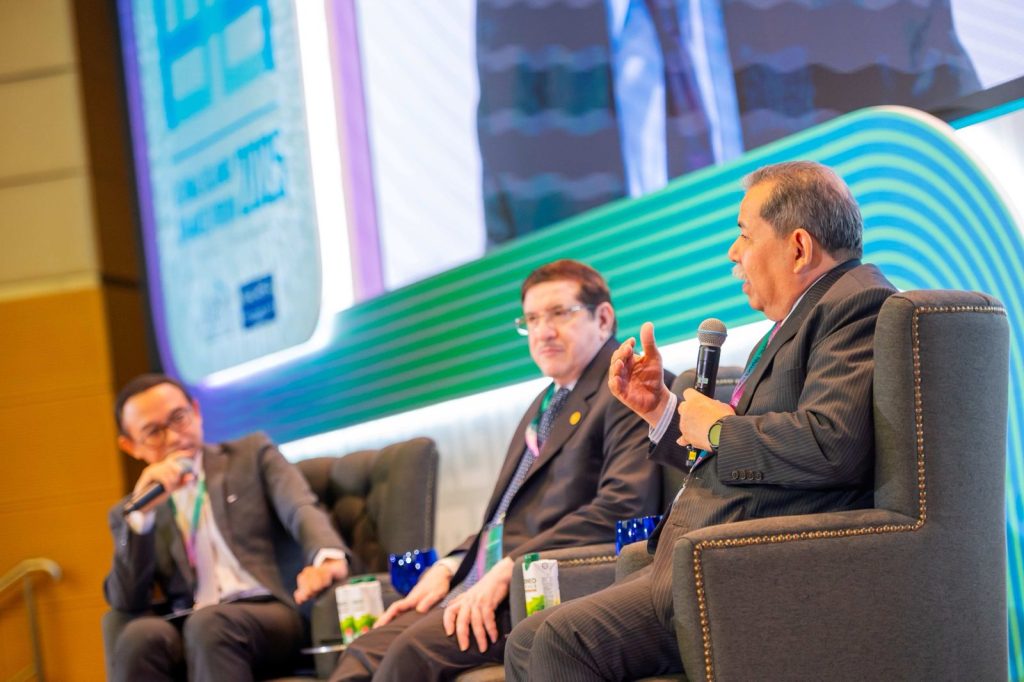
Kuala Lumpur, Malaysia (13 October 2025): The opening session of the Global Islamic Finance Forum (GIFF) 2025, titled “Unlocking the Power of Intra-OIC Investment – Building Bridges to Enhancing Economic Cooperation,” set an ambitious tone for the two-day event.
The discussion explored how Islamic finance can serve as a unifying force for member nations of the Organisation of Islamic Cooperation (OIC), catalysing trade, investment and sustainable growth within the Muslim world.
The session brought together Dr. Mahmoud Mohieldin, UN Special Envoy for Financing Sustainable Development; Dr. Sami Al Suwailem, Acting Director General of the IsDB Institute; and Professor Emeritus Dato’ Dr. Mohd Azmi Omar, President and CEO of INCEIF University.
The panellists noted how OIC countries represent nearly a quarter of the world’s population, yet their collective contribution to global GDP remains below 10% — a gap that can be closed only through stronger financial integration, innovation, and collaboration.
Dr. Mahmoud Mohieldin observed that OIC nations must “multiply whatever we are doing by threefold” to achieve equitable growth. He highlighted the urgent need to bridge the USD1 trillion funding gap for sustainable development within the OIC, arguing that “finance must be placed in context — linking finance to political economy, diversification and inclusion.”
Citing Malaysia’s pragmatic approach to ASEAN cooperation, he called for regional and sub-regional solutions that localise finance, encourage private equity participation, and invest in human capital. “We must invest in people as much as in climate and nature,” he said.
Adding a practical dimension, Dr. Sami Al Suwailem outlined the Islamic Development Bank Institute’s initiative to develop a digital counter-trade platform that would enable OIC member states to exchange goods and services without reliance on hard currency.
Leveraging fintech, blockchain and AI, such a mechanism could, he said, “mitigate currency crises, support small and medium enterprises, and match buyers and sellers across the OIC.” He saw clearly vast untapped potential in how intra-OIC imports totalled just USD500 billion out of USD2.6 trillion globally in 2023.
Professor Emeritus Dato’ Dr. Mohd Azmi Omar drew from Malaysia’s four decades of experience in Islamic finance, identifying regulatory depth, talent development and government commitment as key success factors.
“Malaysia’s gradual, pragmatic and inclusive approach ensured a level playing field,” he said. “To replicate this across OIC countries, we need harmonised regulations, skilled regulators and trained judges who understand Islamic finance.” He also urged countries to leverage digital platforms to democratise access to sukuk and Islamic investment instruments for youth and small investors.
The panellists converged on a common theme: that human capital, trust and regional cooperation form the true foundation of intra-OIC prosperity. They highlighted the OIC’s demographic advantage — a youthful population ready to drive innovation — but warned that without adequate financing, training and technological investment, the potential dividend could be lost.
“Invest in youth,” said Dr. Al Suwailem. “They are the most likely to innovate, adopt technology, and create new wealth.”
Dr. Mohieldin concluded that OIC countries must challenge outdated perceptions, improve data transparency, and communicate their real economic strengths to global markets. “Defaults in our countries are far lower than perceived. We deserve better treatment from capital markets,” he said. “By building trust, integrating regionally, and investing inclusively, we can turn today’s fragmentation into a constellation of shared prosperity,” he said.